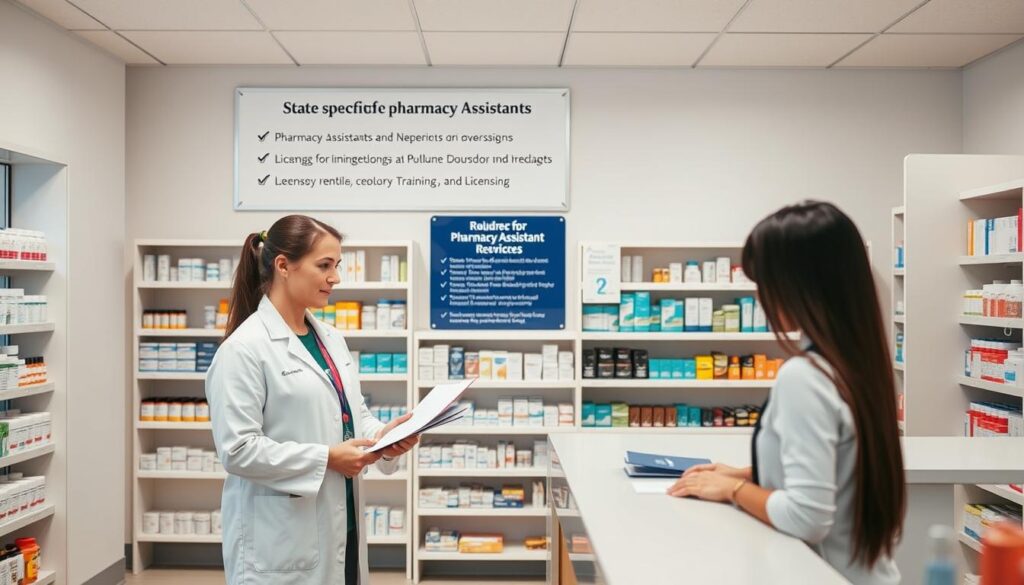Are you looking for a rewarding career in healthcare without needing a degree? Pharmacy assistant roles can be your stepping stone into the healthcare industry.
As a vital part of healthcare settings, pharmacy assistants support pharmacists and technicians with various tasks, ensuring the smooth operation of healthcare services.
By starting as a pharmacy assistant, you can gain valuable experience and insight into the healthcare industry, potentially leading to further career advancement opportunities.
Key Takeaways
- Pharmacy assistant roles are crucial in healthcare settings.
- You can start a healthcare career without a degree.
- Gaining experience as a pharmacy assistant can lead to career advancement.
- Pharmacy assistants support pharmacists and technicians.
- The role provides valuable insight into the healthcare industry.
The Growing World of Pharmacy Assistant Jobs
The demand for pharmacy assistants is on the rise, driven by the expanding healthcare industry. As the population ages and healthcare needs increase, the role of pharmacy assistants becomes more critical. You can expect to be part of a dynamic environment where your contributions support the smooth operation of pharmacies.
Key Responsibilities and Daily Tasks
Pharmacy assistants handle a variety of tasks that are essential to the daily operation of a pharmacy. According to Kaiser Permanente, their responsibilities include prepackaging and labeling medications, stocking shelves, and handling non-professional phone calls. You will also assist pharmacists and technicians with tasks such as processing prescriptions and managing inventory.
Your day may involve working at the counter, interacting with patients, and performing administrative duties. Attention to detail and organizational skills are crucial in this role, as you will be handling medications and managing records.
Difference Between Pharmacy Assistants, Technicians, and Pharmacists
Understanding the distinctions between pharmacy assistants, technicians, and pharmacists is essential. Pharmacy assistants support the team with administrative and basic tasks. Pharmacy technicians have more responsibility, including processing prescriptions and preparing medications under the supervision of a pharmacist. Pharmacists are highly trained professionals who dispense medications and advise patients on their use.
Each role is vital to the healthcare system, and understanding these differences can help you navigate your career path. As a pharmacy assistant, you are part of a team that provides critical support to patients and healthcare providers.
Why Pharmacy Assistant Positions Are Ideal Entry-Level Healthcare Careers
If you’re looking to start a career in healthcare without a degree, pharmacy assistant positions offer a promising pathway. You can embark on a fulfilling career that is both accessible and rewarding.

Low Barrier to Entry Without Degree Requirements
One of the most significant advantages of becoming a pharmacy assistant is the low barrier to entry. Unlike many healthcare roles, you don’t need a degree to get started. Many pharmacy assistants learn on the job, acquiring the necessary skills and knowledge as they work. This makes it an ideal entry-level position for those new to healthcare.
Stable Industry with Growing Demand
The healthcare industry is known for its stability, and pharmacy assistant roles are no exception. With an aging population and an increased focus on healthcare services, the demand for pharmacy assistants is on the rise. This growth means that you can expect a stable career with opportunities for advancement. Programs like those offered by Wake Tech can further enhance your career prospects by providing relevant training and education.
Exposure to Healthcare Systems and Medication Knowledge
As a pharmacy assistant, you’ll gain valuable exposure to healthcare systems and develop a strong understanding of medication management. This hands-on experience is invaluable, providing you with a solid foundation for your career. You’ll learn about different medications, their uses, and how they are dispensed, giving you a comprehensive understanding of the pharmacy environment.
Essential Skills and Qualities for Successful Pharmacy Assistants
Becoming a successful pharmacy assistant requires a combination of interpersonal skills, technical knowledge, and organizational abilities. As a pharmacy assistant, you’ll be the frontline staff interacting with patients, handling prescriptions, and supporting pharmacists.
Customer Service and Communication Skills
Excellent customer service and communication skills are crucial for pharmacy assistants. You’ll need to effectively interact with patients, understand their needs, and provide clear information about their medications. According to Kaiser Permanente, excellent verbal and written communication skills are essential, as is the ability to work effectively as a team member.
Attention to Detail and Accuracy
Pharmacy assistants must be meticulous in their work, ensuring accuracy when handling prescriptions, labeling medication, and maintaining patient records. Attention to detail is critical to prevent errors and ensure patient safety.
Basic Math and Computer Proficiency
Basic math skills are necessary for tasks such as counting medication and handling cash transactions. Additionally, computer proficiency is required for managing patient information, processing prescriptions, and operating pharmacy management systems.
Organization and Multitasking Abilities
Pharmacy assistants need to be organized and able to multitask, handling multiple tasks simultaneously in a fast-paced environment. This includes managing phone calls, assisting patients, and supporting pharmacists with their duties.
By developing these essential skills and qualities, you’ll be well-equipped to succeed as a pharmacy assistant and provide valuable support to pharmacists and patients alike.
Education and Training Options Without a Degree
You can become a pharmacy assistant without a degree by leveraging different education and training pathways. Various programs and training opportunities are designed to equip you with the necessary skills and knowledge to excel in this role.
On-the-Job Training Opportunities
Many pharmacies, such as McKesson and Kaiser Permanente, offer on-the-job training for pharmacy assistants. This training allows you to learn directly from experienced professionals and gain hands-on experience in a real-world setting. On-the-job training covers essential tasks, including prescription processing, patient interaction, and inventory management.
Certificate Programs and Their Benefits
Certificate programs in pharmacy assisting are available through vocational schools and community colleges. These programs typically cover topics like pharmacology, pharmacy law, and medication safety. By completing a certificate program, you can enhance your job prospects and demonstrate your commitment to potential employers. Certificate programs usually take a few months to a year to complete and can be a valuable addition to your resume.

Online Courses and Resources
For those who prefer flexible learning, online courses and resources are available. Websites like Coursera and edX offer courses related to pharmacy assistance and healthcare. These online resources allow you to learn at your own pace and can be particularly useful for those balancing work or other commitments. Additionally, professional organizations like the American Pharmacists Association provide valuable resources and training materials.
By taking advantage of these education and training options, you can develop the skills needed to succeed as a pharmacy assistant and lay the groundwork for future career advancement.
How to Find and Apply for Pharmacy Assistant Jobs
To land a pharmacy assistant job, you need to know where to look and how to apply effectively. The process involves several key steps, from crafting a compelling resume and cover letter to acing the interview.
Creating a Targeted Resume and Cover Letter
Your resume and cover letter are crucial in making a good first impression. When applying for pharmacy assistant positions, highlight relevant skills such as customer service, basic math, and computer proficiency. Use your cover letter to tell a story about why you’re interested in the role and how your skills align with the job requirements.
For example, you might mention any experience you have working in healthcare or handling cash transactions. Tailor your application materials to each job you apply for, using keywords from the job posting to show you’re a strong fit.
Where to Find Job Openings
Job openings for pharmacy assistants can be found on various platforms. Start by checking healthcare job boards and the career sections of pharmacies’ websites. Companies like Kaiser Permanente list available positions on their websites and provide guidance on the application process.
- Check online job boards like Indeed and LinkedIn
- Visit the career pages of major pharmacy chains
- Network with professionals in the field through events or online forums
Preparing for Interviews: Common Questions and Best Responses
Preparing for an interview involves researching common questions and practicing your responses. Some common questions include “Why do you want to work in a pharmacy?” and “How would you handle a difficult customer?”
To prepare, research the pharmacy and practice answering behavioral questions using the STAR method (Situation, Task, Action, Result). This will help you provide clear, concise answers that showcase your skills and experience.
- Review common interview questions for pharmacy assistant positions
- Practice your responses to highlight your strengths
- Prepare any materials you may need, such as copies of your resume and references
Understanding State Requirements for Pharmacy Assistants
Understanding the regulatory landscape is essential for anyone looking to become a pharmacy assistant, as requirements differ by state. As you navigate your career path, it’s crucial to be aware of the specific regulations in your state to ensure compliance and enhance your job prospects.

States with Formal Registration Requirements
Some states have implemented formal registration requirements for pharmacy assistants. For instance, certain states mandate that pharmacy assistants register with the state’s pharmacy board, which may involve background checks and completing specific training programs. You should check with your state’s pharmacy board to determine if registration is required and what the process entails.
States with Minimal Requirements
In contrast, some states have minimal requirements for pharmacy assistants, with little to no formal registration or licensure needed. However, even in these states, having some form of training or certification can be beneficial for your career advancement. You may want to consider obtaining a certificate or completing an online course to enhance your skills and make yourself more competitive in the job market.
Regardless of your state’s specific requirements, staying informed and adapting to any changes in regulations will be key to your success as a pharmacy assistant. By understanding and complying with state requirements, you can focus on delivering excellent patient care and advancing your career in the healthcare industry.
Workplace Settings and Environments
Pharmacy assistants can be found working in diverse environments, from retail pharmacies to hospital settings. This variety allows you to choose a work setting that aligns with your interests and career goals. Whether you’re interested in directly interacting with patients or working behind the scenes, there’s a place for you in the pharmacy assistant world.
Retail Pharmacy Opportunities
Working in a retail pharmacy means you’ll be on the front lines, interacting with customers, answering questions, and helping with prescriptions. Retail pharmacies are often fast-paced, especially during flu season or promotional events, requiring you to be efficient and multitask.
Hospital Pharmacy Settings
In a hospital pharmacy, you’ll be part of a critical team that manages medications for inpatients and outpatients. Hospital pharmacies often require more specialized knowledge, as you’ll be dealing with a wide range of medications and complex patient needs.
Mail-Order and Specialty Pharmacies
Mail-order pharmacies and specialty pharmacies offer another avenue for pharmacy assistants. These settings often involve more behind-the-scenes work, such as processing prescriptions, managing inventory, and ensuring timely delivery of medications to patients.
| Workplace Setting | Key Responsibilities | Work Environment |
|---|---|---|
| Retail Pharmacy | Customer service, prescription filling | Fast-paced, customer-facing |
| Hospital Pharmacy | Medication management, patient care | Specialized, team-oriented |
| Mail-Order/Specialty Pharmacy | Prescription processing, inventory management | Behind-the-scenes, detail-oriented |
Kaiser Permanente, a leading healthcare provider, operates in various settings, including retail, hospital, and mail-order pharmacies, offering diverse opportunities for pharmacy assistants. This diversity in workplace settings not only broadens your career options but also enriches your experience as a pharmacy assistant.
Salary Expectations and Career Growth Pathways
As you consider a career as a pharmacy assistant, understanding the salary expectations and growth opportunities is crucial. This role not only provides a stable income but also opens doors to various career advancements in the healthcare sector.
Average Pay Ranges Across Different Settings
The salary for pharmacy assistants can vary based on the work setting. In retail pharmacies, the average pay ranges from $12 to $15 per hour. Hospital settings often offer slightly higher wages, ranging from $14 to $18 per hour. Mail-order and specialty pharmacies may also offer competitive pay scales, sometimes with additional benefits.
According to the Bureau of Labor Statistics, the median annual salary for pharmacy assistants was around $30,000 in recent data. However, salaries can fluctuate based on location, experience, and specific employer.
Benefits and Perks Common in the Industry
Pharmacy assistants often receive a range of benefits beyond their salary. These can include health insurance, paid time off, and retirement plans. Some employers, like Kaiser Permanente, offer competitive pay and benefits, as well as opportunities for career advancement and professional growth.
Additional perks may include discounts on medications, professional development opportunities, and a dynamic work environment.
Advancing from Assistant to Technician and Beyond
Starting as a pharmacy assistant, you can advance your career by gaining experience and additional education. Many assistants choose to become pharmacy technicians, a role that requires certification but offers higher pay and more responsibilities.
With further education and training, you can progress to roles such as a licensed pharmacist or other healthcare professionals. The initial step into a pharmacy assistant role can thus be the beginning of a rewarding and progressive career path.
Conclusion: Taking Your First Steps Toward a Rewarding Pharmacy Career
Embarking on a career as a pharmacy assistant can be a pivotal step toward a fulfilling healthcare career. With the right training and support, you can build a successful and rewarding career in this field. As discussed, handling 50+ prescriptions daily in high-traffic pharmacies, starting salaries ranging from £18,000 to £23,000, and opportunities for career growth make this an attractive career path.
You can explore various education and training options, including on-the-job training, certificate programs, and online courses, to equip yourself with the necessary skills. Visit TWC London’s blog to learn more about the daily responsibilities and requirements of a pharmacy assistant. By taking the first step and pursuing this career, you can achieve healthcare career success and enjoy a stable and rewarding profession.